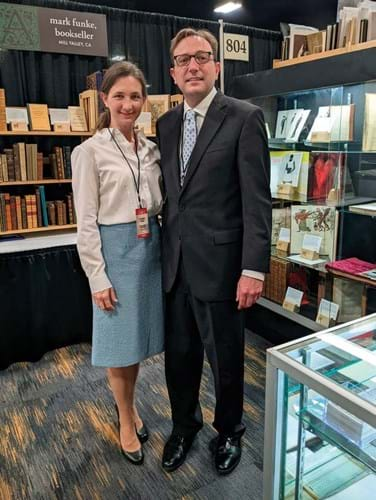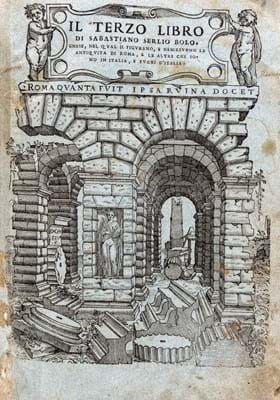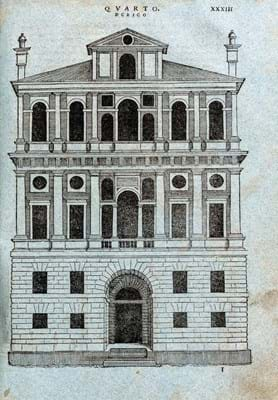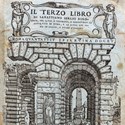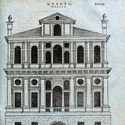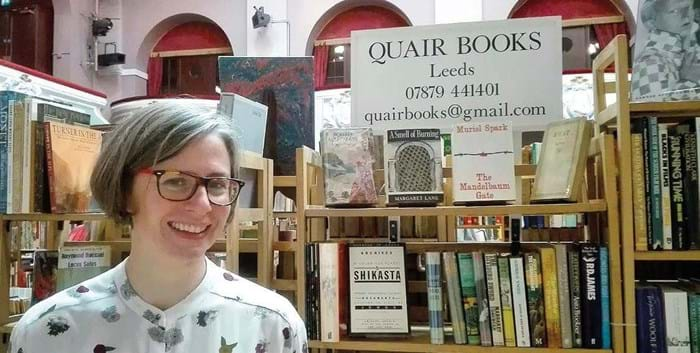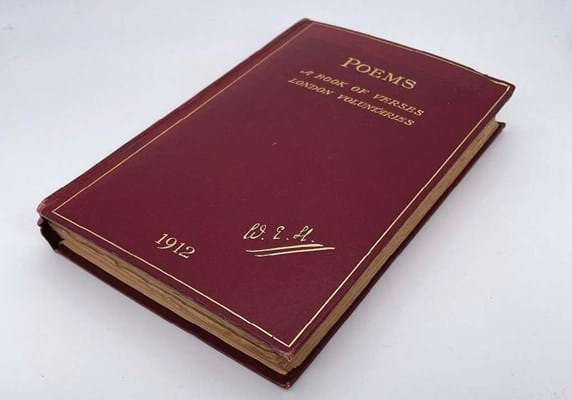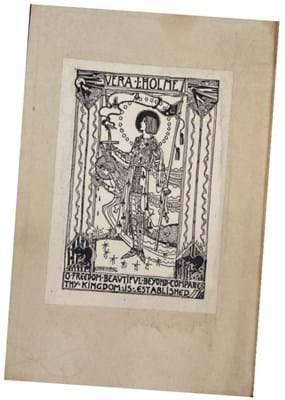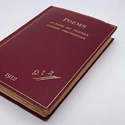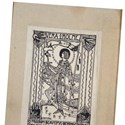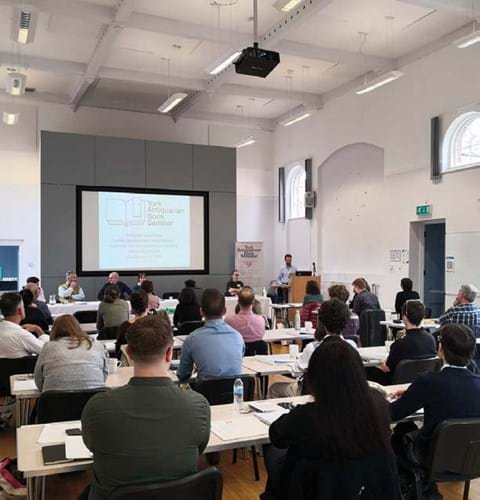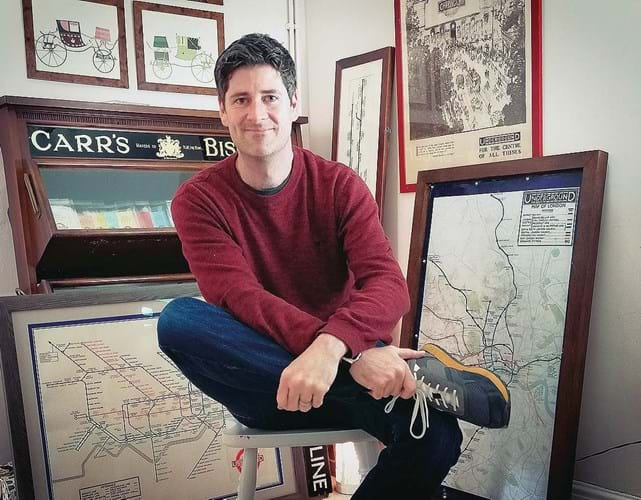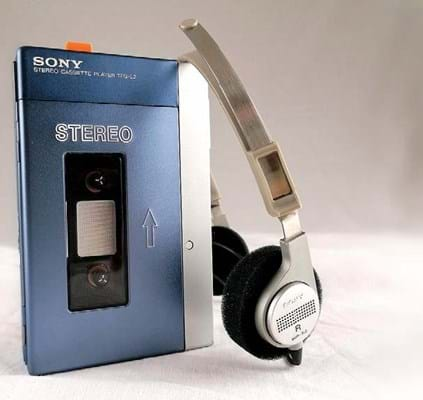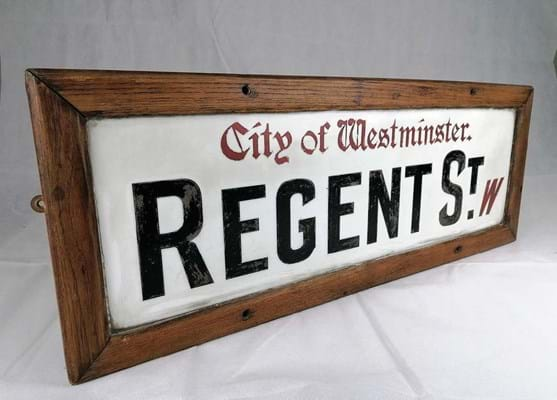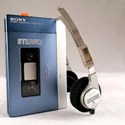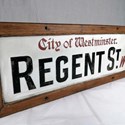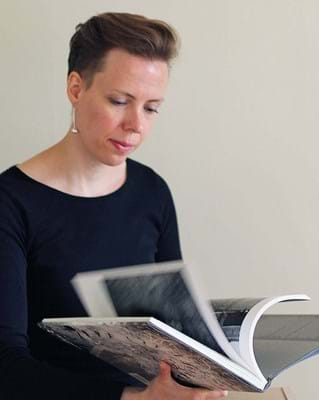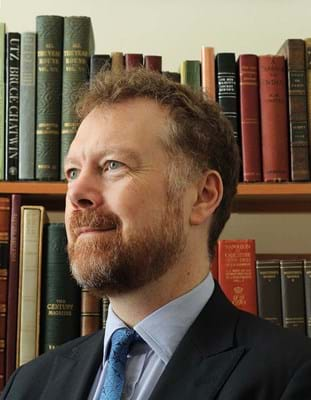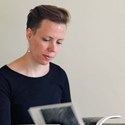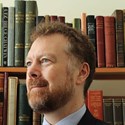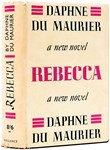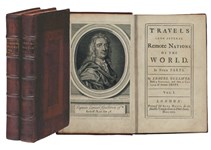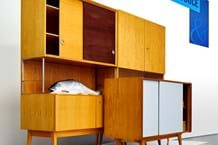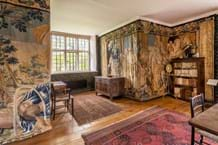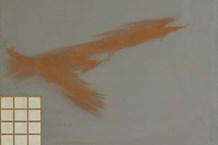Mark Funke, Funke Books
When and how did you go about becoming a book dealer?
I started in the trade in 2014 and attended the York Antiquarian Book Seminar in September that year. It was instrumental in helping me decide to move into bookselling full time. I had a prior career practising law and really wanted to do something completely different.
I remember telling my wife Joanna when I registered for YABS that the reason I wanted to attend was to evaluate whether selling rare books could be a viable career. My conclusion was that yes, it’s hard, but it’s possible, so let’s do it!
Do you have qualifications and training that have proved important for working with rare books?
All of us have life experiences we bring to the trade. I spent many years reading and writing very long contracts, which I believe helps my ability to research books and write descriptions. My law practice was also my own business, so I bring with me significant experience running a small business with all the accounting and paperwork associated with it.
Have you always been a bibliophile?
I started attending rare book fairs with my parents while I was in college – so I think the answer to that question has to be ‘yes’.
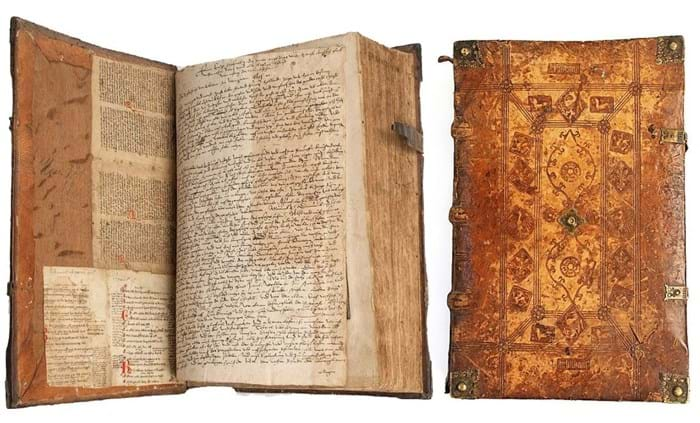
Funke takes this sammelband with two Nürnberg post-incunabula (1518 and 1519) by Pelbartus von Temesvar to Rare Books Palm Springs this month. The text is the source for the Érdy-codex, a famous Hungarian manuscript, with a three-page addition regarding the parable of the workers in the vineyard. It is offered for $2950.
Is there a collecting area you have decided to focus on and why?
I’m a dual citizen – German and American – and we concentrate on a lot of German material. We also travel every year to Germany and Austria to buy and sell books. To a great extent, my interest in German books was the impetus for becoming a bookseller.
How do you maintain your training?
Unfortunately, due to Covid, I haven’t been able to participate in ongoing educational development. I really want to attend classes at the California Rare Book School and the Rare Book School in Virginia. Now that in-person classes are opening up again, I hope to attend some soon.
Is there something you would like to change or improve about the book trade?
I strongly believe in the cross-border benefits of the trade. We all need each other. Dealers in North America should support their international counterparts because some of the best material sold in the US comes from overseas. In Europe export restrictions can be burdensome and are sometimes applied arbitrarily. International shipping charges from the US to elsewhere in the world can be up to 10 times the cost of shipping a book in the opposite direction.
What advice do you have for someone new to the business?
You can always sell the items you are personally the most excited about. Find material you are passionate about and you will be successful at selling it.
What recent buying or collecting trends have you noticed?
Our recent catalogue on sciencefiction did very well and it sold almost exclusively to institutions. In contrast, our other recent catalogue on inflation and economics sold almost exclusively to private collectors. At live book fairs, I am seeing a strong interest in general antiquarian material. I find it interesting how different mediums and different topics appeal to different buyers.
Cosima Benson-Colpi, Forum Auctions
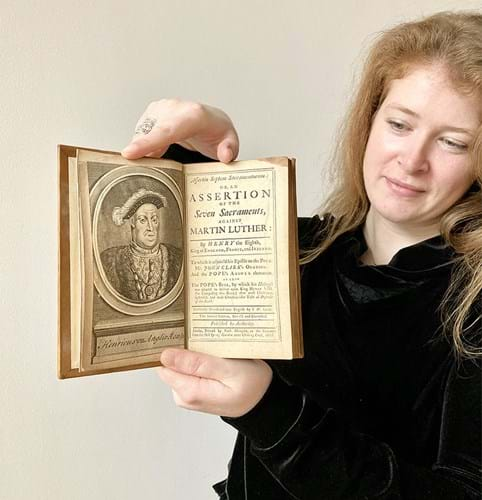
Cosima Benson-Colpi together with a copy of Henry VIII, Assertio Septem Sacramentorum, 1688, sold for £950 at Forum Auctions in January 2021 as part of an online sale of books from the Library of the late Brian Findlay.
When and how did you go about becoming a book auctioneer?
I began working at Forum Auctions as an intern in the autumn of 2020 and have been a member of the book department ever since. Having decided that the world of rare books was where I wanted to be, I consider myself extremely lucky to have been put in touch with Rupert Powell [Forum’s managing director].
Do you have qualifications and training that have been important to working with rare books?
My desire to work in rare books was born out of a love of history and an academic background in theology, which I read as an undergrad and masters at Oriel College Oxford.
Have you always been a bibliophile?
A bibliophile – yes, but not a bookworm. I appreciate the beauty, history and intellect that a rare book combines. The stunning incunables in the monastic library at my school, Downside, had long been a fascination, but it was when writing my dissertation – focused on one of only five known illuminated manuscript copies of the Meditationes Vitae Christi belonging to Corpus Christi College – that I decided to pursue this as a career.
Is there a collecting area you have decided to focus on?
Definitely. My interests are well defined. I am enthralled by anything Italian, the older the better – for example, the intriguing copy of Sebastiano Serlio’s Terzo Libro on architecture printed on blue-paper (1540) (which we sold in March 2021) introduced me to the buzzing world of Venetian printing.
Otherwise, I am passionate about anything to do with Catholic heritage. I was delighted to unpick the mystery of a calligraphic manuscript dedicated to the Barberini family during the reign of Urban VIII we sold in September 2021. I am always thrilled when such material presents itself and happy to spend hours – possibly too long – on research and cataloguing.
How do you maintain your training?
For me it is definitely a case of learning on the job. There is such a huge range of material which comes into Forum that I am constantly expanding my knowledge in terms of subject area, literature and book manufacture. For example, just the other week I began with a collection relating to theatrical history and ended with a 17th century atlas on the eastern Mediterranean.
Is there something you would like to change or improve about the book trade?
Like many industries, perhaps the predominant face of the book trade is still male. However, I find myself in a department with several talented women, passionate about the work they do.
It has also been great over the past year to meet and correspond with other young women across the trade. I have yet to meet a female collector with a grand library to rival some of the greats, but I always look forward to that day as she would surely be a fascinating and inspirational person.
What advice do you have for someone new to the business?
Be proactive in searching out opportunities, keep an open mind when they present themselves and remember to try and keep teaching yourself as you go along.
What recent buying or collecting trends have you noticed?
A clear feature of the market is the strength of English books – from Chaucer and Shakespeare to Tolkien and Fleming. English literature is hugely popular and selling very well right now. The big names are certainly fetching big prices.
Fiona Philip, Quair Books
When and how did you go about becoming a book dealer?
My first serious job following my undergraduate degree was at Unsworth’s Antiquarian Booksellers, then based in Bloomsbury. By the end of my tenure, I’d advanced from bookseller to antiquarian assistant and so my relationship with rare books began.
Though I returned to higher education and subsequently worked at the University of Leeds for almost a decade, I always kept a toe in the bookselling world, occasionally working at fairs for Unsworth’s, as well as collecting. When I decided to leave academia in 2016, I began working towards launching my own rare books business.
Do you have qualifications and training that have proved important for working with rare books?
In retrospect, my academic trajectory – from natural sciences, through history and philosophy of science and gender studies to my doctoral work in queer-feminist modernist film and literature – has lent me a breadth of knowledge that has proved invaluable. I have also worked with archives and the digitisation of heritage collections.
This accidental or coincidental training was honed for the rare book world when an Abebooks bursary gained me admittance to the York Antiquarian Book Seminar (YABS) in 2018. With no traditional route into rare bookselling, YABS, like its US counterpart, ABS (the Antiquarian Book Seminar), offers professional development for would be antiquarian booksellers.
Is there something you would like to change or improve about the book trade?
Bridges are being built to invite and interest broader publics into what has historically been a rarefied field. Alongside research libraries and universities, the rare book trade can play a role in fostering connections and interest with even more collectors, who might not previously have seen themselves and their interests represented and valued. This is an exciting time, with online book fairs – an initiative begun through the pandemic – offering wider, global access to the rare book trade.
What advice do you have for someone new to the business?
Join a trade association: in the UK we have both the Provincial Booksellers Fairs Association (PBFA) and the Antiquarian Booksellers’ Association (ABA).
Christopher Berry, Iconic Antiques
How did you go about becoming a dealer?
My wife and I began operating as Iconic Antiques in late 2019, just before the coronavirus pandemic.
We have been collecting maps, posters and other 20th century collectables for about 12 years, and the leap from hobby to full-time career was enabled by a compelling redundancy offer from my employer. I still can’t quite believe it has happened, but I now feel I have the coolest job in the world.
Curating and selling these wonderful items is an absolute pleasure. We have grown in size and subject matter over the last three years and while our stock is eclectic it has a common thread: moments of outstanding design in the 20th century.
How has your previous career helped as a map dealer?
During my (very corporate) career I worked in business strategy where good information design was central to communicating the direction of our business. I also trained in art and graphic design at various levels and have a degree in geophysics so cartography was embedded into everything I studied.
Over time these skills and knowledge converged to give me a deep appreciation for information design. I love uncovering the stories behind the objects we sell and I am constantly learning through research and general curiosity. There is no piece of paper that can guarantee integrity and knowledge. That must be earned through reputation. So far so good!
What is your area of focus?
Early 20th century London and the London Underground in particular. It was a period of great energy, excitement, innovation and massive transition from old to new.
While horses pulled carts above ground, electric trains ran in tunnels deep beneath their hooves. There is a rich body of pioneering design from that period, particularly in the form of commercial maps and posters.
What recent buying or collecting trends have you noticed?
The market for vintage computing, gaming and audio is growing fast, driven by nostalgia among the kids of the 80s and 90s who are now in their 40s. This is an area we already operate in but would like to expand.
What advice do you have for someone new to the business?
It’s a tough industry to earn an immediate and consistent income. I was fortunate to have received a redundancy package that gave me the breathing space to build the business. This career is about the long game.
I advise anyone jumping into this trade to either ease into it part-time while having a ‘day job’ or, if fulltime, to ensure you have a sufficient financial buffer so that your business can freely fluctuate month to month without immediately impacting your personal financial situation.
Mark James and Anke Timmermann, Type & Forme
When and how did you go about becoming a book dealer?
MJ: I started my professional life in rare books through a highly speculative application for a cataloguer’s job at Christie’s South Kensington. Another applicant – who did possess the necessary skills – was hired, but Christie’s asked whether I would be interested in becoming a porter, should a position become available. Three months later I started and eventually (after a brief sabbatical at Sotheby’s) became an associate director in the book department at Christie’s King Street.
AT: I came to the book trade a bit later. I had specialised in scientific manuscripts at university, finished a PhD at Cambridge, and then entered a career as a bibliographer, book historian, and the author of a monograph on early modern alchemical manuscripts. A few years later I returned to Cambridge as the Munby Fellow at the University Library, where – alongside compiling a catalogue of alchemical manuscripts as a late successor to MR James (who admitted to having no knowledge of the subject matter) – I immersed myself in the wider world of rare books. I found it too fascinating not to become involved and once the fellowship ended, I started at Bernard Quaritch, where Mark and I worked together for a few years before establishing Type & Forme in 2018.
Have you always been bibliophiles?
MJ: I have been collecting books since I was a teenager, and a holiday job in a second-hand bookshop broadened my interests and collection, particularly with regards to modern first editions. Since my daily pay could be taken in kind, I would usually leave each day with an overflowing bag of books and a handful of pennies!
AT: I loved books as a child but it was not until I was a student that I discovered antiquarian books proper. There is a large second-hand and antiquarian bookshop right in the middle of the Hauptstrasse in Heidelberg, which I visited frequently. I do not think I fully realised at the time how much the repeated browsing of the stock and the conversations with booksellers – both direct and overheard – expanded my knowledge of books.
How do you maintain your training?
Our professional development often takes place through our research into the books we handle. Our catalogue descriptions are quite detailed, and writing them provides excellent opportunities to immerse ourselves in the literature. We find The Library, The Book Collector and Fine Books & Collections – all of which we also contribute to – very useful sources for current developments in book history. And, of course, Antiques Trade Gazette is an indispensable guide to events and trends in the wider market. Finally, there are many excellent conferences and lectures (both in-person and virtual), including those organised by the Bibliographical Society.
Is there something you would like to change or improve about the book trade?
AT & MJ: The recent collaborations between rare book dealers, auctioneers and libraries to recover missing or stolen books and manuscripts have been very encouraging – from the 2015 British Library conference The Written Heritage of Mankind in Peril to the Missing Books Register of the International League of Antiquarian Booksellers (ILAB), which is constantly being updated. A good recent example of this collaboration was Cambridge University Library’s successful public appeal for the return of Charles Darwin’s missing notebooks, which was undertaken with the support of the rare book trade and ILAB. Type & Forme played a part in this by assisting with the authentication of the notebooks when they were anonymously returned.
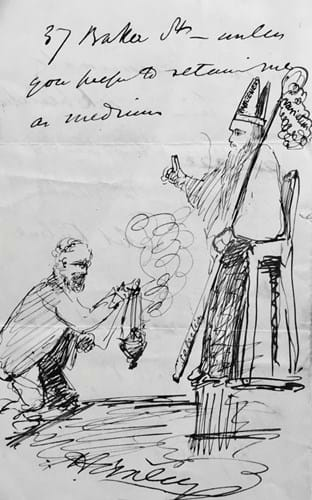
Type & Forme has a particular interest in the works of Charles Darwin. Recently, the firm advised the descendants of Charles Darwin’s granddaughter, Margaret Darwin, on her autograph collection, which includes this cartoon of ‘St Darwin’. This collection has now joined the world-leading Darwin holdings at Cambridge University Library under the acceptance in lieu scheme.
What advice do you have for someone new to the business?
AT: There is no right or wrong way to enter the field. Whether it is through a degree in book history or a traineeship, whether at an antiquarian bookseller’s or an auction house, and whether through direct work on books and manuscripts or in any of the adjacent fields, there are many paths that lead to destinations in the book world that are not even obvious at the outset. Curiosity is key.
MJ: The book trade is so varied it is always possible to find a corner to make your own. See as much as you possibly can. Identify people whose knowledge you admire and learn as much as you possibly can from them. Most people in the field are really enthusiastic about books, so no matter how distinguished they are, they will often share their knowledge gladly.
What recent buying or collecting trends have you noticed?
AT & MJ: Twenty years ago there seemed to be much concern about where the next generation of book collectors would come from, but the evidence of recent years shows that these fears were ill-founded. The collecting market is constantly evolving.
Anke is a judge for two book collecting prizes and has really enjoyed being introduced to new fields by young collectors. For instance, this year’s joint winner of the David Murray Book Collecting Prize in Glasgow, Sydney Paige Guerrero, is building a fantastic collection of Filipino comics (or ‘komiks’), which are often ephemeral in nature, self-published, or produced in very small numbers to be sold at specialist conventions. Through her collection, Sydney is preserving important cultural heritage – and demonstrating that, above all, skill, canniness, and perseverance make for a great collection. The future of book collecting is in very good hands.



